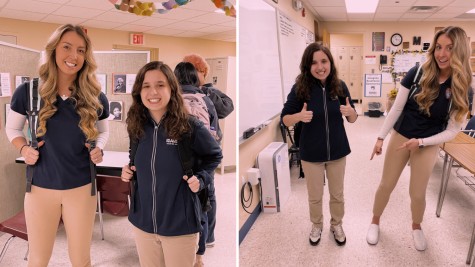The ups and downs of ‘remote learning’
The dynamic too often causes a lack of energy and focus
Google image/Creative Commons license
Students are expected to attend virtual classes and do remote work, but it’s often not easy.
With school swiftly moving from traditional classrooms to the internet, the “virtual education” experience has been an interesting adjustment for everyone, to say the least.
Due to the COVID-19 pandemic, all schools in Massachusetts are closed for the rest of the school year. Most schools have turned to the internet as the means to keep students learning from home. It has come with mixed results.
AMSA has been holding online classes and teachers have been giving assignments to students.
Many classes are held via teleconference, usually through Google Meet, where students are expected to attend and participate.
I have around six to eight online classes per week. I have two online classes a week each for my two AP classes (AP Literature and AP U.S. History), one online class a week for Spanish and Journalism, and an online class once every couple of weeks for Calculus and American Hate: The Dark Side of American History. Virtual office hours are offered biweekly for Physics and Calculus.
The classes are somewhat enriching; we are slowly moving forward with new material, but it is hard to learn much from a few classes a week compared to classes five days a week for 45 minutes each. There is minimal participation from students, although more people did start attending the classes when they became mandatory three weeks ago.
“Not worth the time to go in there,” said Andrew Moran, an AMSA junior. Andrew added that he did not feel like he was learning and that he wished classes were more of a check-in to see if we understand what the homework is.
In my online classes, there are many awkward moments of silence when a teacher asks a question and no one responds. Are the lack of responses a result of no one feeling like it? Are they not paying attention? Is the experience just too foreign?
I do sometimes like my online classes, but I think at times that they can be quite boring. This should probably be expected. It’s just not like being in the classroom, because the class energy is missing.
And it’s hard to be motivated with the uncertainty of the future and big changes happening in very short periods of time.
Everyone’s schedules have been messed up because of the lack of structure we get from a regular school day, so it is harder to resist procrastinating on assignments and putting in minimal effort for school work.
“If people have the opportunity not to do the work, they won’t do the work,” Andrew said.
Students are still adjusting to the online experience, but it is quickly becoming part of our daily routines. The majority of us like to sleep in now since our sleep schedules are scrambled, so we may be annoyed at having to wake up early to join our classes, but I’ve noticed that some students like that it motivates us to wake up earlier.
Self-quarantine was initially fun and relaxing, but now we are quickly becoming bored and we are starting to miss school, our friends, and our daily lives.

Nishi is a junior and has been attending AMSA since 6th grade. This is her first year writing for The AMSA Voice. She hopes to expand her knowledge of...






